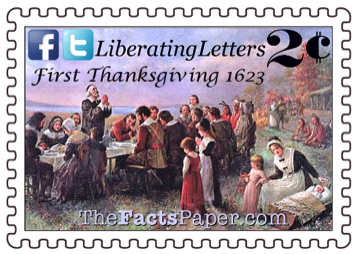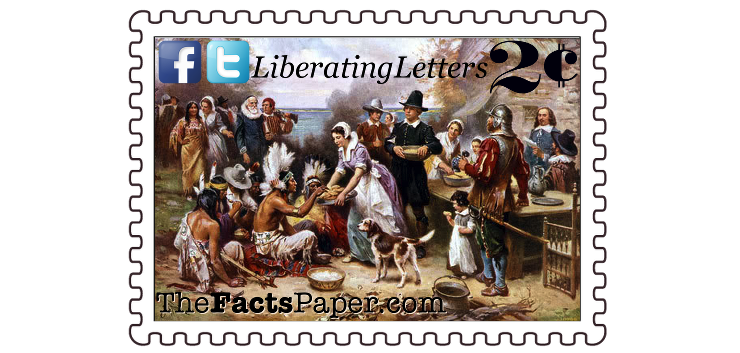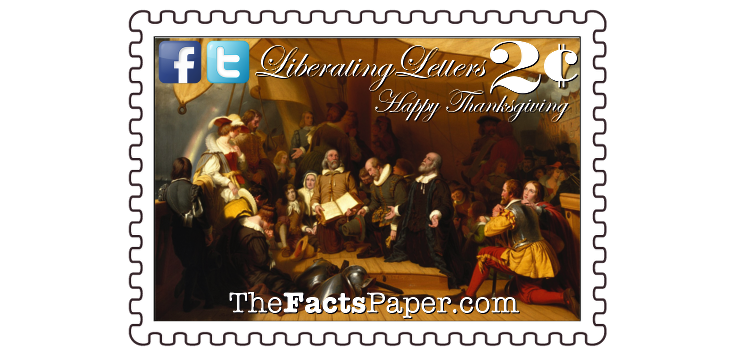By “accident”, or God’s hand, these brave men and women were given an opportunity to set up a republic form of government, different from any government seen before. (see God's Divine Providence) The English settlers before them were part of the English crown where the Pilgrims were considered the true first Americans (not withstanding the Native Americans).
After signing the agreement, the Pilgrims voted John Carver to be the first elected governor in the English colonies. Landing on a Saturday, the group stayed aboard the Mayflower and Elder Brewster guided them in a day of worship to God. William Bradford recorded their praise. "Being thus arrived in a good harbor and brought safe to land, they fell upon their knees and blessed the God of Heaven who had brought them over the vast and furious ocean."
Crossing Cape Cod Bay, the Pilgrims found Plymouth Rock and decided they would make their settlement there. They continued to live and sleep on board the Mayflower while they began construction on their new little community. The winter was harsh and about half of the new Americans died, including Bradford’s wife, who fell off the ship and drowned. Disease, illness, and the cold took the rest.
Those that made it through the winter put their hearts, minds, and souls into their new world. In the spring of 1621, the Mayflower left to return to England and the Pilgrims met Native American Squanto. Squanto befriended the Englishmen teaching them how to fertilized the land, plant crops and fish. Bradford believed Squanto was a “special instrument sent of God for their good beyond their expectation.” Squanto, along with his Indian brethren, were loved and admired by the Pilgrims. But as much as Squanto taught them, he couldn’t make the crops grow because he couldn’t make it rain.
In July of 1623 Bradford wrote of a horrible drought that plagued the community for months. Crops were beginning to wither under the extremely dry situation. It was then the Pilgrims “set apart a solemn day of humiliation, to seek the Lord by humble and fervent prayer, in this great distress. And He was pleased to give them a gracious and speedy answer, both to their own and the Indians’ admiration that lived amongst them.”
However, today’s textbooks claim the first Thanksgiving was a celebration of thanks to the Indians for helping bring a good harvest. All references of God are removed, yet it is hard to argue when the facts are presented. Bradford made it clear he and the Pilgrims thanked God for their blessings. Rain came “which did so apparently revive and quicken the decayed corn and other fruits, as was wonderful to see, and made the Indians astonished to behold. And afterwards the Lord sent them such seasonable showers, with interchange of fair warm weather as, through His blessing, caused a fruitful and liberal harvest, to their no small comfort and rejoicing. For which mercy, in time convenient, they also set apart a day of thanksgiving. . . .” Some scholars are trying to rewrite history claiming this was not a reference to the traditional “Thanksgiving Day”, arguing there was a separate thanksgiving day praising the Indians. Historical documents prove otherwise. Indians were definitely invited guests to the 3-day celebration but there is no mistake God was still the guest of honor.
The Pilgrims came here for the freedom to worship God. They truly appreciated the help and generosity of the Indians, however their thankfulness for those helpers went to God. To do otherwise would go against their whole purpose of coming to America. Though we must try our best to witness to God’s greatness, there will always be those that will refuse to see Him. But what is indisputable, once the facts are reviewed, is this country was started by Christian people who gave all glory and honor to God the Father and founded a republic on Judeo-Christian values.
Thanks be to GOD!
That’s my 2 cents.
Love,
Mom
November 27, 2014
Dear Liberty,
A hundred years after Martin Luther nailed his 95 Thesis on the All Saint’s Church door, people all over Europe were fighting to worship God as they chose. ( see The Knock Heard 'Round The World) Luther and other reformers translated the Bible into multiple languages, giving the people direct access to the Word of God. Thanks to the printing press, designed by Johann Gutenburg in the mid-1400’s, thousands of Bibles were printed allowing commoners to read God’s Word for themselves for the first time. (see All In Due Time)
As the freedom of reading the Bible swept through Europe, so did the desire to freely worship God. (see Here I Stand) The people realized they did not need the King or the Pope to tell them what God said, or in some cases, didn’t say. Rulers throughout the area, both secular and religious, used a heavy hand to try to squash the new religious sects taking root since the Reformation.
A particular denomination called Separatists, for their desire to separate from the Church of England, fled from England to Holland in 1608 to escape King James’ persecution. After taking refuge there for eleven years several members decided to travel to the New World in search of true religious freedom. Since Christopher Columbus’ discovery over 120 years earlier, several European rulers had sent explores, workers and settlers to the New World with England overseeing most of the east coast. In this new land there was still oversight from the throne, but there was also freedom and liberty to worship as they chose.
One of the instrumental Separatists, William Bradford, not only organized bringing the Pilgrims to America, he documented their travels and experiences in Of Plymouth Plantation which is central to knowing the truth of their history. Being orphaned at a young age, he was only 18 when he fled with the Separatists to Amsterdam, then to Leiden. Five years later he married Dorothy May, who was only 16, in 1613. When the couple set off for the Americas in 1620, they left their young son, John, in Holland with relatives, hoping to retrieve him when they got settled in the New World. The one thing Bradford did take along with him was his 1592 Geneva Bible which would be a cornerstone of everything he built.
The Separatists sought and were granted permission via the First Pierce Patent to sail to the Americas and begin the first settlement in the northern part of Virginia Colony. The Separatists hired their friend Captain Myles Standish, a member of Queen Elizabeth’s army, to accompany them on their adventure and be their military leader. His expertise was desired to establish and organize the settlement’s defense of both foreign (Spanish, Dutch, French) and domestic (Native) foes.
The trip to the New World would take money and the 50 Separatists, or “Saints” as they called themselves, didn’t have much of it. They had no choice but to partner with non-Separatists, or “Strangers”, to make the trip. Several tradesmen, adventures and servants who were seeking their own opportunities signed on to the voyage.
Beginning in July of 1620, the “Saints” and “Strangers” started their pilgrimage down the English Channel. There were originally two ships, but due to costly repairs for the leaking Speedwell, the passengers all crammed onto the Mayflower before it left its final port in Plymouth, England on September 6/16, 1620. (Two numbers are often given at this time period to show the Julian Calendar date (former) and today’s Gregorian Calendar (latter).) (see As Time Goes By) Including the Pilgrims and a 30+ crew led by Captain Christopher Jones, there were 102 passengers in all.
It took two months to reach the New World and it was anything but smooth sailing. Many passengers suffered from sea sickness for most of the trip. After a major beam broke, it was feared the ship would have to turn around and go home. Thanks to the supplies brought by the Pilgrims, the beam was reinforced and the trip continued. One passenger, John Howland, fell overboard but miraculously grabbed a topsail halyard that was trailing behind the ship. Passengers were able to pull him back on board unharmed.
On November 9/19, 1620, land was sighted by the crew, but bad weather forced them up the coast from their intended destination in the Virginia Colony to what is now Cape Cod. Since they landed north of their patent’s boundaries rendering it invalid, some of the passengers decided this would be an opportunity to challenge the authority granted to the Pilgrim leaders by the patent. Realizing there must be some form of law and order and wanting to encouraged unity and preservation of the group, most colonists agreed to work together to establish a fair government, or civil body politic, promoting justice, equality, and responsibility requiring the consent of the governed. Using the Old and New Testament as their guide, they established the Mayflower Compact that was signed aboard ship on November 11/21, 1620, by most adult men. The Compact was America’s first call for freedom. (see America's First Founding Document) It demonstrates our Christian tradition and values and was a precursor to the Constitution.
THANKS BE TO GOD


Text of Mayflower Compact:
In the name of God, Amen. We whose names are under-written, the loyal subjects of our dread sovereign Lord, King James, by the grace of God, of Great Britain, France, and Ireland King, Defender of the Faith, etc.
Having undertaken, for the glory of God, and advancement of the Christian faith, and honor of our King and Country, a voyage to plant the first colony in the northern parts of Virginia, do by these presents solemnly and mutually, in the presence of God, and one of another, covenant and combine our selves together into a civil body politic, for our better ordering and preservation and furtherance of the ends aforesaid; and by virtue hereof to enact, constitute, and frame such just and equal laws, ordinances, acts, constitutions and offices, from time to time, as shall be thought most meet and convenient for the general good of the Colony, unto which we promise all due submission and obedience. In witness whereof we have hereunder subscribed our names at Cape Cod, the eleventh of November [New Style, November 21], in the year of the reign of our sovereign lord, King James, of England, France, and Ireland, the eighteenth, and of Scotland the fifty-fourth.



